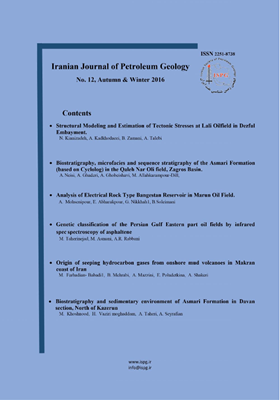تجزیه و تحلیل گونه های سنگی الکتریکی مخزن بنگستان در میدان نفتی مارون
الموضوعات : پترو فیزیکابوذر محسنی پور 1 , بهمن سلیمانی 2 , احسان ابهرک پور 3 , قدرت الله نیکخواه 4
1 - علوم زمین
2 - دانشگاه شهیدچمران
3 - شرکت ملی حفاری
4 - شرکت ملی حفاری
الکلمات المفتاحية: گونه¬, سنگی الکتریکی, واحد¬, جریانی, مخزن بنگستان, کیفیت مخزنی,
ملخص المقالة :
مطالعات مربوط به گونه های سنگی الکتریکی نقش بسیار مهمی را در فرایند توسعه یک میدان ایفا می کند. در این مطالعات از داده های تخلخل-تراوایی مغزه و لاگ های چاهپیمایی جهت شبیه سازی مخزن استفاده می شود. در پژوهش حاضر در ابتدا با استفاده از داده های تخلخل و تراوایی حاصل از مغزه چاه پیمایی به روش شاخص منطقه ای جریان چهار واحد جریانی برای این مخزن تعیین گردید. در تعدادی از چاههای میدان با استفاده از لاگ های چاهپیمایی مدل اولیه گونه سنگی الکتریکی به سه روش SOM ، MRGC و DYNAMICتعیین گردید، رخساره های تعیین شده با روشهای مختلف با واحد جریانی تعیین شده تطابق داده و از بین آنها روش SOM که دارای بیشترین تطابق بود انتخاب گردید،از بین 9 الکتروفاسیس اولیه ایجاد شده با توجه به شباهت برخی از پارامترها مانند تخلخل موثر و لاگ گاما به 4 الکتروفاسیس تقلیل داده شد، جهت اطمینان از دقت تعئین گونه سنگی الکتریکی توسط شبکه های عصبی، این الکتروفاسیس ها با داده های فشار موئینه تطابق داده و پس از تائید الکتروفاسیس های تعیین شده با فشار موئینه این رخساره ها در سایر چاههای میدان انتشار داده شد که منجر به ایجاد مدلی گردید که توانایی جدایش بخش های مختلف مخزنی را از همدیگر دارا بود. در این مدل قسمت های مختلف مخزن از نظرکیفیت مخزنی تعیین گردید.
قنواتی، ک.، 1379، مطالعه تکمیلی زمین¬شناسی مخزن بنگستان میدان مارون، شرکت ملی مناطق نفتخیز جنوب، گزارش پ-4946.#
کدخذائی ایلخچی،ر. رضایی،م.ر. موسوی حرمی، ر. کدخدائی ایلخچی،ع.، 1393، بررسی رخساره¬های الکتریکی مخزنی در قالب واحدهای جریانی هیدرولیکی در میدان ویچررنج مربوط به حوضه پرت واقع در استرالیای غربی، پژوهش¬های چینه¬نگاری و رسوب-شناسی سال سی¬ام، شماره پیایی 54، شماره اول، صفحه 1-22.#
مطیعی، ه.، 1382، زمینشناسی ایران، چینهشناسی زاگرس، سازمان زمین شناسی و اکتشافات معدنی کشوري، چاپ اول ، 536صفحه.#
Abbaszadeh, M.D., Fujii, F., Fujimoto, F., 1996.Permeability Prediction by Hydraulic Flow Units-Theory and Applications”, SPE Formation Evaluation, 11:263-271.#
Amaefule, J.O., Altunbay, M., Tiab, D., Kersey, D.G. and Keeland, D.K., 1994. Enhanced reservoir description: using core and log data to identify hydraulic (flow) units and predict permeability in uncored intervals/wells. SPE Paper26436, 1–16.#
Cassano, E.N., Lynch, A.H., Cassano, J.J., Koslow, M.R., 2006. Classification of synoptic patterns in the western Arctic associated with extreme events at Barrow, Alaska, USA. Clim. Res. 30, 83–97.#
Cole ou, T., Poupon, M. and Azbe, K., 2003. Unsupervised seismic facies classification: areview and comparison of techniques and implementation. The Leading Edge 22, 942–953.#
Diday, E., Simon, J. C., 1980. Digital Pattern Recognition, Springer-Verlag Berlin Heidelberg, 234 pp.#
ECL, 2002, Full Field Study and preparation of master development plan of Marun (Bangestan) oil field, phase 2: reservoir characterization.#
Elgaghah, S.A., Tiab, D., Osisanya, S.O., 1998. Improved reservoir description of shaly sands using conventional well log-derived data for flow units identification. Paper SPE 39803. SPE Permian Basin Oil and GasRecovery Conference Midland, TX, USA. March 25–27.#
Fayos, J., Fayos, C.,. 2007. Wind data mining by Kohonen neural networks, PLoS ONE 2, p 210.#
Gunter, G.W. et al., 1997. Early determination of reservoir flow units using an integrated petrophysical method. SPE 38679, P 373-380.#
Jongkittinarukorn, K., Tiab, D., 1997. Identification and characterization of flow units inshaly sands. Journal of Petroleum Science and Engineering 17, 237– 246.#
Kadkhodaie-Ilkhchi, A., and A. Amini, 2009, A fuzzy logic approach to estimating hydraulic flow units from well log data: A case study from the Ahwaz Oilfield, south Iran: J. Pet. Geol. v. 32, p. 67-78.#
KohonenT.1995., " Self-Organizing Maps. Springer ", Berlin.#
Kohonen, T., Kaski, S. Lappalainen, H., 1997. Self-organized formation of various invariantfeature filters in the adaptive-subspace SOM. Neural Computation 9, 1321-1344.#
Lee, S.H., A. Kharghoria, and A. Datta-Gupta, 2002, Electrofacies Characterization and Permeability Predictions in Complex Reservoirs: SPE Reservoir Evaluation & Engineering, 237-248.#
Lucia, J.F., 2007, Carbonate Reservoir Characterization An Integrated Approach. 2nd Edition, Springer-Verlag Berlin Heidelberg, 341 pp.#
Mathisen, T., S.H. Lee, and A. Datta-Gupta, 2001, Improved Permeability Estimates in Carbonate Reservoirs Using Electrofacies Characterization: A Case Study of the North Robertson Unit, West Texas: paper SPE 70034 presented at the SPE Permian Basin Oil and Gas Recovery Conference, Midland, TX, May 15-16.#
Mukherjee, A., 1997. Self-organizing neural network for identification of natural modes.TheJournal of Computing in Civil Engineering 11 (1), 74-77.#
Perez, H.H., A. Datta-Gupta, S. Mishra, 2005, The role of electrofacies, lithofacies and hydraulic flow units in permeability prediction from well logs: A comparative analysis using classification trees: SPE Reservoir Evaluation & Engineering, v. 8, p. 143-155.#
Sfidari, E., Amini, A., KadKhodaie,A., Ahmadi,B.,2012, '' Electrofacies clustering and a hybrid intelligent based method for porosity and permeability prediction in the South Pars Gas Field, Persian Gulf'', JGeope2(2),2012,p.11-23.#
Sfidari, E., Kadkhodaie-Ilkhchi, A., Najjari, S., 2012.''Comparison of intelligent and statistical clustering approaches to predicting total organic carbon using intelligent systems''.Journal of Petroleum Science and Engineering 86-87, 190-205.#
Shedid A. S. and Reyadh A. A., 2002,“A New Approach of Reservoir Description of Carbonate Reservoirs”, SPE 74344, 1- 10.#
Strecker, U., Uden, R., 2002. Data mining of 3D poststack seismic attribute volumes using Kohonen self-organizing maps. The Leading Edge 21, 1032-1037.#
Wilmann, T., Merenyi, E. and Hammer, B,. . 2003. Neural maps in remote sensing image analysis. Neural Networks 16, 389-403.#
Winland H. D., 1972. Oil Accumulation in Response to Pore Size changes.Weyburn field, Saskatchewan.Amoco Production Research Report No.F72-G-25, 197.#


